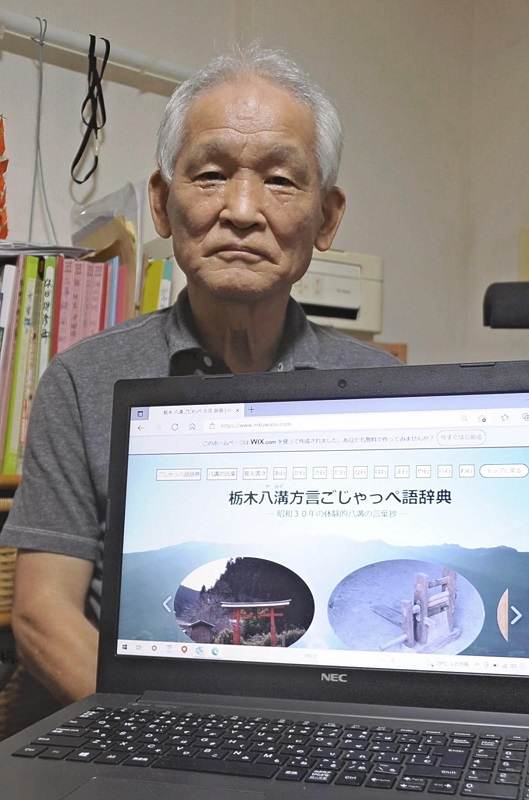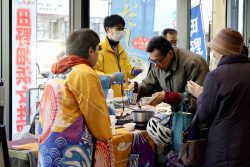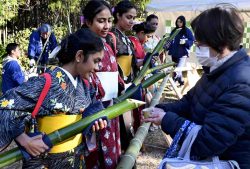
Masamitsu Kuwano is seen in Utsunomiya
13:41 JST, September 14, 2021
NAKAGAWA, Tochigi — A retired Japanese-language teacher fighting leukemia has created a dictionary for a disappearing local dialect from his hometown in Tochigi Prefecture and recently put it online.
Masamitsu Kuwano, 77, the creator of “Tochigi Yamizo Hogen Gojappe Jiten” (The Yamizo dialect in Tochigi Prefecture joke dictionary), is from the now-defunct village of Ouchi, now part of Nakagawa town. The online dictionary features a dialect from the Yamizo region in the eastern part of Tochigi Prefecture.
Kuwano finished writing the dictionary during his fight with the serious illness, hoping to leave a record of his hometown.
“The Yamizo area experienced significant changes amid rapid social development following World War II,” said Kuwano. “I hope people will learn about the history of the region through the words.”
Born in January 1944 in the now-defunct village of Ouchi, Kuwano worked as a Japanese language teacher at schools such as the Utsunomiya Girls’ High School. Kuwano served as the head of the Nakagawa town board of education after retiring.
Kuwano has long been proud of his health, but he was diagnosed with acute leukemia at the age of 72. The disease forced him to be hospitalized for about a year.
The retired teacher compiled the dialect while fighting the disease, determined to spend the rest of his life recording the words of the Yamizo area.
He has been living in Utsunomiya, in the prefecture, for a long time, and he left the house where he was born vacant as he brought his parents to live with him. Feelings of guilt for his part in the depopulation of his hometown drove him to make the dictionary.
The dictionary contains 1,334 words, most of which were used in his youth in around 1955. Rapid industrialization at the time enticed young people to cities, with many villagers abandoning farming to work for companies. Even in Ouchi, where leaf tobacco, konjac cultivation and forestry were flourishing, many left for the city.
“It was the last moment when the nature, customs, culture, and human relationships of the prewar period were still intact,” recalled Kuwano.
Among words found in the dictionary, “kitai” and “gozappataki” stand out.
His dictionary defines kitai as “an unanticipated event, which can be positive or negative” and gives an example sentence, “It was ‘kitai’ for such a thing to happen.”
The word “gozappataki” is defined as “those who eat and drink without considering the convenience of the house where they gather. It is also called ‘zanbarai.’”
Kuwano made notes of the words he was planning to include in the dictionary while he was in the hospital and visited his hometown after being discharged to confirm with elder locals the detailed nuances of the words.
There were many words that were no longer in use. Kuwano continued to write down what he learned from the elders as they felt nostalgic for the words. He included in the dictionary examples of how to use the words as much as possible.
The word “gojappe” in the title of the dictionary means “a lie or a joke,” but Kuwano incorporated the word into the title because he likes how it sounds.
“Words are history itself,” he said. “The words used in an ordinary farming village will only disappear if they are no longer used. I hope to have been able to repay my hometown a little.”
Related Tags
Top Articles in Features
-

Sapporo Snow Festival Opens with 210 Snow and Ice Sculptures at 3 Venues in Hokkaido, Features Huge Dogu
-

Tokyo’s New Record-Breaking Fountain Named ‘Tokyo Aqua Symphony’
-

Tourists Flock to Ice Dome Lodge at Resort in Hokkaido, Japan; Facility Invites Visitors to Sleep on Beds Made of Ice
-

High-Hydration Bread on the Rise, Seeing Increase in Specialty Shops, Recipe Searches
-

Heirs to Kyoto Talent: Craftsman Works to Keep Tradition of ‘Kinran’ Brocade Alive Through Initiatives, New Creations
JN ACCESS RANKING
-

Japan PM Takaichi’s Cabinet Resigns en Masse
-

Japan Institute to Use Domestic Commercial Optical Lattice Clock to Set Japan Standard Time
-

Israeli Ambassador to Japan Speaks about Japan’s Role in the Reconstruction of Gaza
-

Man Infected with Measles Reportedly Dined at Restaurant in Tokyo Station
-

Man Infected with Measles May Have Come in Contact with Many People in Tokyo, Went to Store, Restaurant Around When Symptoms Emerged























